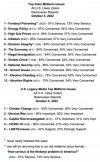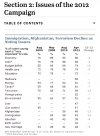OPEC+’s decision this week to
slash oil production – and now the looming threat of higher gas prices – has pushed Republican rhetoric into familiar territory: President Joe Biden’s
green policies are making Americans pay more at the pump.
Energy experts say recent attempts to open up new parts of the US to oil drilling have failed mainly because of the lack of interest from oil companies themselves, rather than Biden’s “green” policies.
New exploration for oil and gas has fallen sharply worldwide this year. Still bruised by an
oil-price crash prolonged by the Covid pandemic, fossil fuel companies are now focusing on areas they know will make money, and far less on exploring for new locations to drill.
“I would say it’s 60% financial markets are telling them ‘no,’” said Robert McNally, president of energy consulting firm Rapidan Energy Group and an energy adviser to former President George W. Bush. “It’s 30% they’re still fearful of another bust, and then 10%, ‘the politicians, they’re not going to make it easy for me.’”
There is perhaps no better evidence of this shift than in the Arctic National Wildlife Refuge, which for decades had been a Republican focus for new oil drilling. Congressional Republicans successfully reopened ANWR to oil drilling in a 2017 bill, but when the lease sale happened in the
final days of the Trump administration, only three companies offered bids – one of which was Alaska’s state-owned energy corporation. The other companies that bid ended up canceling their leases this year.
The ANWR sale “was a total bust,” said Erik Grafe, an attorney for environmental law firm Earthjustice. “There were no oil majors who bid on leases.”
In May, the Biden administration
canceled an offshore drilling lease sale in Alaska’s Cook Inlet, owing to “lack of industry interest.” The Inflation Reduction Act will force the Interior Department to offer it again by the end of the year, but there aren’t expected to be many – if any – bids on it.
Oil and gas companies around the world are driving this trend as they approach new oil and gas exploration tepidly.
There are several reasons oil and gas companies are pulling back on new exploration but chief among them is the financial landscape.
Fossil fuel companies and markets are still reeling from the economic downturn during the pandemic and the associated oil price crash, according to Rachel Ziemba, an energy expert and adjunct senior fellow at the Center for a New American Security.
Now they are trying to limit their risk by sticking to projects that are assured to generate oil.
Experts say fossil fuel companies are sticking to drilling in regions that are sure bets for oil and gas, like the Permian Basin shown here in Texas.
“There is a lot of recognition by financial institutions that it’s a bad bet to be trying to get oil out of the Arctic in particular,” Grafe said. Part of that is social and political pressure, he said. The other part is that
permafrost is melting, making the terrain more unstable and more difficult to drill on.
McNally doesn’t believe the world is ready to give up fossil fuels
he thinks the global oil market is at the very beginning of another multi-year boom cycle, which he predicts will bring about new leasing in Canada and the United States, as well as new exploration in South America and West Africa.
“We’re going to realize we need more investments in hydrocarbons,” McNally said. “Anyone who’s got opportunities, capital and political will, I think all of that is going to come back into vogue.”











